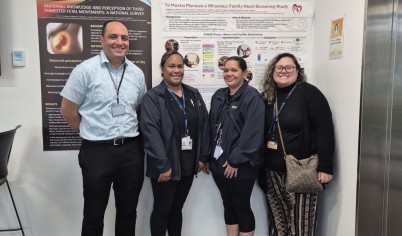A team led by paediatric infectious diseases specialist Associate Professor Rachel Webb has developed and tested a new nurse-led approach for offering echocardiograms (heart scans) to siblings of children recently diagnosed with acute rheumatic fever (ARF) at Kidz First Children’s Hospital in Counties Manukau.
Despite evidence showing siblings of ARF patients have approximately three times higher risk of rheumatic heart disease (compared to children in families where no one else is affected), siblings are not routinely offered a heart scan or any additional health checks for rheumatic heart disease.
Dr Webb says workforce shortages are partly to blame, with not enough cardiac sonographers in many regions of Aotearoa New Zealand, particularly in areas where high levels of economic deprivation co-exist with extremely high rates of cardiovascular disease.
“In Counties Manukau, this has led to unacceptably long waiting lists for outpatient heart scans for people with rheumatic heart disease and to a very overstretched cardiac sonographer and clinical workforce,” she says.
There is a good theoretical case for earlier detection of rheumatic heart disease (RHD).
“If a heart scan picks up rheumatic heart valve damage in the early (mild) stages, that person could have long-term treatment with penicillin and their health outcomes would typically be very good, with them leading a normal active life. Severe rheumatic heart disease, on the other hand, can lead to open heart surgery with devastating impacts on long-term health and wellbeing,” says Dr Webb.
Using an HRC Health Sector Research Collaboration Grant, Dr Webb worked with a team of Māori and Pacific nurses, doctors and qualitative health researchers. Dr Adam Dennison, a Samoan paediatrician and the project's coordinating investigator, established a training programme for Māori and Pacific nurses to perform focused (screening) echocardiograms for RHD and implemented a nurse-led RHD echo-screening clinic for siblings of ARF patients from August 2023 until April 2024. Researchers from the National Hauora Coalition, led by Dr Rachel Brown and Dr Anneka Anderson, worked with whānau affected by ARF to document their experiences and to develop a new whānau-centred clinical model.
Sixty-eight families participated in the clinic and 155 children had an echo-screen. Ten children were found to have rheumatic heart disease, and 8 had another heart problem requiring a specialist follow-up. Overall, about 1 in 10 children had a heart problem and about 1 in 5 whānau required additional support from the team during the clinic (e.g. referrals for other health concerns, kai or social supports).
Dr Webb and Dr Dennison say the whānau who participated were very positive about the nurse-led model of care, which they found empowering and preferable to the current service model they receive.
“The training of nurse sonographers for rheumatic heart disease is a first for New Zealand and may go some way towards addressing health workforce shortages and improving rheumatic fever services in Counties Manukau,” says Dr Webb.
